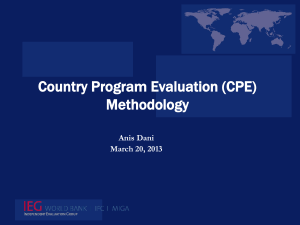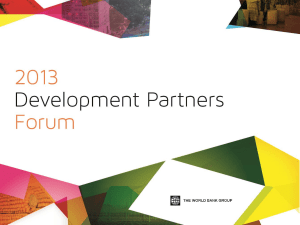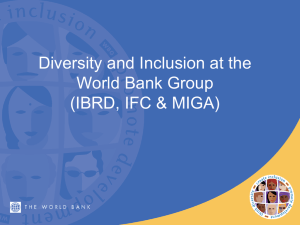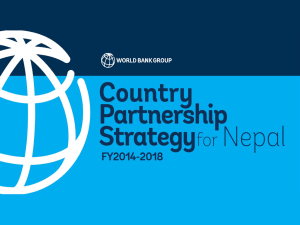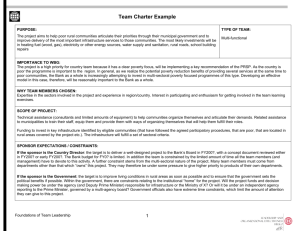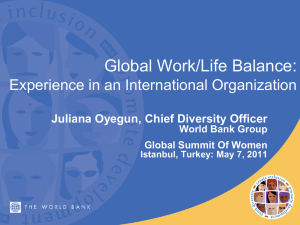corporate scorecard - Bretton Woods Project
advertisement
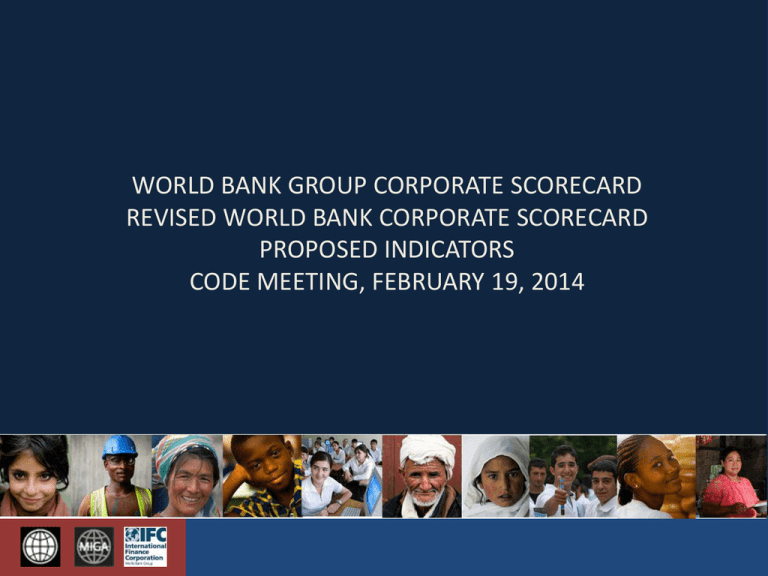
WORLD BANK GROUP CORPORATE SCORECARD REVISED WORLD BANK CORPORATE SCORECARD PROPOSED INDICATORS CODE MEETING, FEBRUARY 19, 2014 Purpose of the Meeting To seek your feedback for the proposed indicators for the World Bank Group Corporate Scorecard (WBG CSC) and the revised World Bank Corporate Scorecard (WB CSC) Guidance is sought for Proposed indicators for WBG and WB CSC Alignment with Goals, Strategy and between WBG and WB CSC Next steps IFC CSC and MIGA KPIs will be aligned with the WBG CSC in FY15 2 WBG and WB Scorecards – format and structure overview 3 WBG CSC – objectives Apex of the WBG Strategy monitoring and reporting framework, supported by the revised WB and IFC Scorecards and MIGA KPIs Reporting on contributions to the two goals under the new WBG Strategy Be the starting point for cascading relevant indicators Goals & Development Context Results WBG Corporate Scorecard WB, IFC, MIGA, Scorecards/KPIs VPU/Business Unit MOU/Performance Agreements/Department Scorecards Staff Performance/Objectives/Results Agreements 4 Performance What’s different? WBG CSC developed for the first time as the apex of the WBG-wide performance measurement system WB CSC is changing FROM • • • Accountability and communications tool Primarily used at the corporate level for a discussion with the Board Brochure with a long list of indicators TO • • • 5 Primarily accountability and management tool with cascading indicators and broader institutional ownership Fewer indicators; their selection guided by the WBG Strategy Moving to an electronic format Implications for indicators Fewer, strategic indicators which are actionable and amenable to targets Can be cascaded and promote desired behavior Supported by rigorous and reliable data For WBG – choice of indicators needs to reflect key WBG contributions include indicators that can be aggregated in a meaningful way and relevant for at least 2 out of 3 WBG institutions take into account that the WBG institutions are operationally distinct and have different clients WBG and WB CSC will be integrated into a broader organizational performance review Change M&E Staff Result Agreements Integrated Performance Information and Data Platform Internal Performance Discussions at all Organizational Levels 6 PDU WBG Corporate Score Card WB, IFC CSCs, MIGA KPIs Quarterly Performance Discussions with the Board Linkages with the change process M&E and PDU Change Process M&E: Key change process outcome indicators included in the Performance section of the WBG and WB CSCs Alignment with PDU: Common areas of interest measured through the same indicators. Most PDU indicators to reinforce CSC indicators. Some PDU indicators time-bound and not suitable for the CSC (e.g., geo-coding) Common indicators harmonized and to be supported by the same data management system Goals PDU Results Performance Change M&E 7 WBG and WB Scorecards – proposed indicators 8 I. WBG Goals and Development Context 9 Will be the same for the WBG and institutional scorecards (included only in WBG CSC) Provides context of ultimate objectives, to which WBG aspires to contribute Measures sustainable progress towards the achievement of the Goals Proposed indicators cover four areas: Indicators for ending extreme poverty and promoting shared prosperity Non-monetary aspects of poverty Elements of inclusive growth and governance Economic, social and environmental sustainability Goals & Development Context Results Performance Data availability, quality and ease of tracking essential Break-down for extreme poor and bottom 40% where data available, break-down for fragile situations and gender where meaningful and feasible Moving forward: Revisions/improvements reflecting Post-2015 agenda Availability of more comprehensive/rigorous indicators and data Evolving research, analysis and methodologies for tracking sustainable progress towards the two Goals by DEC, GPs/CCSAs etc. Goals and Development Context WBG GOALS End extreme poverty: Population below US$1.25 a day Promote shared prosperity: Median of growth rates of average real per capita income of the bottom 40 % Non-monetary aspects of poverty* Inclusive growth and Governance* % with access to water % with access to sanitation % with access to electricity % with access to a phone % of children at school % with a transaction account (and % who are female) % of poor with access to essential health, nutrition and population services GDP/capita Countries with growth concentrated on the poor Working people who are poor (%) Private sector capital formation (% GDP) Agriculture value added per worker Public access to information Countries with no discriminatory law against women *separate for FCS where possible *separated by extreme poor and bottom 40% where possible Sustainability Share of countries with wealth depletion Share of countries with debt ratio to GDP over a sustainability threshold CO2 equivalent emissions per kg equivalent PPP$ of GDP Annual deforestation rate Population living in areas under water stress Population weighted average exposure to PM2. Countries mainstreaming disaster risk management 10 II. Client Results supported by WBG/WB operations 11 Communicate results, which contribute to sustainable progress towards the two WBG goals and are based on client demand Goals & Development Context Results Reinforce focus on development outcomes and support management for development results Client results, but with attribution to WBG/WB-financed operations –actual results achieved in the reporting period Performance Indicator principles : Contribute to the Goals and aligned with the Strategy, representative of WBG/WB activities, reflecting WBG/WB client demand Can be meaningfully aggregated at the WBG/WB level Reflect outcomes/outputs as opposed to inputs Break-down for FCS and for female beneficiaries where meaningful/feasible Moving forward: Fill in placeholders (e.g., jobs, private sector catalyzed) Continued harmonization across WBG (and where relevant across MDBs) Develop more indicators for cross-cutting solutions Develop better ways of measuring and aggregating indirect contribution, including impact of knowledge and advisory services Fine-tune the composition of the indicators according to the areas prioritized in CPFs, balance low-income and middle-income country priorities etc. WBG CSC: Results supported by WBG operations WBG GOALS Supporting human development People who have received essential health, nutrition and population services Students reached Building and accessing vital infrastructure People provided with access to an improved water source People provided with access to improved sanitation facilities People provided with new or improved electricity service A transport placeholder People reached with ICT (tbd) 12 Enhancing inclusive growth and private sector development People and microenterprises/SMEs using financial services Farm household beneficiaries reached Power generation Private sector investments catalyzed (pending methodology harmonization) Jobs (pending definition and methodology) Trade (tbd) Enhancing environmental sustainability and climate resilience Climate change mitigation indicator tbd (pending methodology completion and harmonization) Revised World Bank CSC: Results supported by WB operations WBG GOALS Supporting human development People that have received any of the essential health, nutrition and population services Students that have benefitted from learning assessments Teachers recruited or trained Beneficiaries covered by social safety net programs Enhancing inclusive growth and private sector development People, microenterprises and SMEs reached with financial services Private sector investments catalyzed (tbd) Jobs (tbd) Power generation (renewable and conventional) Farmers adopting improved agricultural technology Area provided with irrigation services Trade tbd Building and accessing vital infrastructure People provided with access to improved water sources People provided access to improved sanitation facilities People provided with access to electricity Km of roads constructed and rehabilitated Strengthening governance and institutions Countries with strengthened public management systems in Civil service and public administration Tax policy and administration Public Financial management Procurement Enhancing environmental sustainability, climate and disaster resilience Emission reductions with support of special climate instruments (replaced with all WB projects when data available) Projected lifetime energy savings Countries supported towards institutionalizing disaster risk reduction as a national priority 13 Blue = additional to WBG CSC III. WBG/WB Performance Provide performance dimensions for WBG/WB operations and deployment of resources Measures of quality of operational outcomes, and higher-level measures of operational and organizational effectiveness, financial sustainability and efficiency Progress on strategy implementation Results Performance Indicator principles Aligned with goals, strategy and critical outcomes of the change process Can be meaningfully aggregated at WBG/WB level Group-wide indicators in WBG CSC. Institution-specific indicators in the institutional CSCs Amenable to targets, actionable, can be cascaded, provide right incentives Break-down for fragile situations where meaningful/feasible Moving forward 14 Goals & Development Context Introduce targets and cascade indicators to relevant business units Incubate challenging indicators (e.g., alignment with the Strategy, knowledge flows, one WBG) Work on indicators for the next level of ambition (e.g., next steps in Science of Delivery) Adapt based on experience Go electronic, improve use of systems and data WBG CSC: Performance WBG GOALS Development outcomes Outcome ratings IEG rating of satisfactory CAS/CPF completion IEG rating for satisfactory outcomes at completion for WB, IFC and MIGA portfolios Knowledge and advisory services effectiveness rating - IFC AS development effectiveness rating - Bank knowledge and advisory objectives accomplished Client feedback Stakeholder feedback on WBG effectiveness and impact on development results Client feedback: - Client satisfaction for IFC IS/AS - Client feedback on WB effectiveness and impact on results Strategic context Alignment with the Strategy - tbd Working as one WBG Measure of joint engagement (tbd) Staff collaboration across institutional boundaries (tbd) Staff perception of working as one WBG 15 Priorities for mainstreaming Gender: Share of country strategies with gender considerations in the analysis, content, and the results framework Climate change: Climate related commitments Operational delivery for clients WBG commitments Commercial/private financing mobilized for clients Reduction of time from a concept to the first disbursement Measure of knowledge flows (tbd ) Client feedback on contribution of WBG knowledge work Financial sustainability Measure of cumulative average revenue growth Gross expenditure reduction Managing talent Staff engagement/leadership effectiveness (tbd) Staff diversity and inclusion Talent management indicator (tbd) World Bank CSC: Performance WBG GOALS Development impact Development outcomes ratings IEG rating for satisfactory outcomes for WB portfolio (IDA, IBRD and other financing) Client rating of Knowledge and Advisory Services objectives accomplished Client feedback Client feedback on WB effectiveness and impact on results Client feedback on WB responsiveness and staff accessibility Strategic context Alignment with the Strategy - tbd Incorporating citizen and beneficiary feedback Share of projects with clear beneficiaries with beneficiary feedback Share of grievances registered related to delivery of project benefits that are actually addressed Priorities for mainstreaming Gender: Share of projects with gender monitoring at design that report on it during implementation Climate change: Commitments with climate change co-benefits Share of projects with climate change co-benefits implementing agreed climate actions Operational delivery for clients Financing for clients WB commitments Private financing mobilized for clients WB disbursements 16 World Bank CSC: Performance (cont.) Quality and timeliness of lending operations IEG rating of Bank Performance At entry During supervision Reduction of time from the concept note to the first disbursement Quality and efficiency of knowledge products Client rating of quality of knowledge and advisory services Share of knowledge and advisory services delivered in timely manner External funding attracted for knowledge and advisory services Using knowledge and science of delivery for results Measure of knowledge flows (tbd) Operations that draw lessons for design from impact evaluation or other evaluative approaches Share of projects with baseline data for all PDO indicators in the first ISR Financial sustainability and efficiency Measure of cumulative average business revenue growth Costs to business income ratio Support costs ratio Managing talent Staff engagement/leadership effectiveness (tbd) Staff diversity and inclusion Talent management indicator (tbd) 17 Timeline and next steps 18 Timeline and Next Steps • • Confirm the indicators with key counterparts Consult with additional stakeholders • • • Jan 2014 Confirm indicator definitions and methodologies (for new indicators) Populate data and baselines Incorporate feedback including from EDs Feb 2014 Feb 19: CODE on a draft WBG and WB CSCs 19 Fill in placeholders Fine-tune scorecards, taking into account the new institutional structure and counterparts (e.g., Global Practices) Cascade indicators to individual business units and start cascading to staff Incorporate feedback from CODE Finalization of a draft WBG CSC Target setting Printing Mar 2014 Mar: Board engagement on CSC (tbc) 2014 Spring Meetings Presentation of the WBG CSC to the Board of Governors FY 2015 Feedback sought 20 Feedback is sought for Proposed indicators for WBG and WB and balance between Development Context, Results and Performance levels Alignment with Goals and Strategy and between WBG and WB CSC Follow up steps during FY15 to fine-tune the CSC in the new institutional structure
